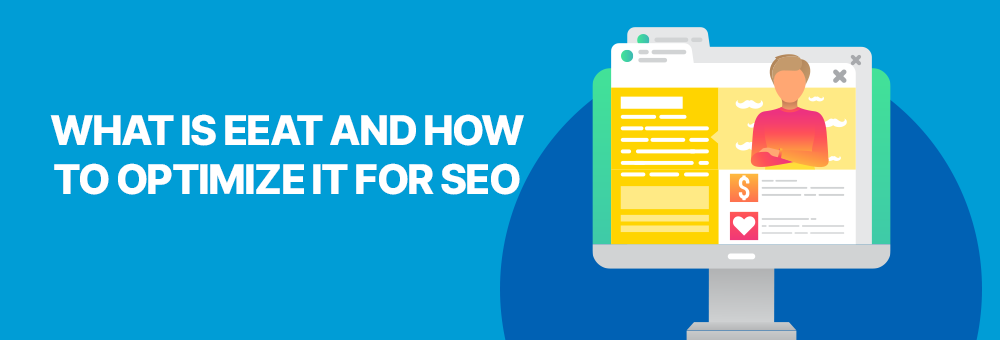In SEO, sometimes we focus too much on overly technical aspects to try to rank our websites and forget about other fundamental elements.
One of these is the credibility of our content.
I invite you to stop thinking like an SEO for a moment and start thinking like an Internet user.
How many times have you searched for information on Google about a topic and found no reasonable results?
Major online newspapers telling you how to go on a diet or which vacuum cleaner is the best on the market.
Influencers, barely of legal age, talking to you about investments.
Niches with content generated directly by artificial intelligence without any subsequent review.
Pages with glaring grammatical errors, which are obviously translated from other languages.
And the list goes on.
Google is aware of this problem and has been trying to put an end to it for years.
Your solution is called E-E-A-T.
Still not sure what these initials mean? Don’t know how to work with it?
Don’t worry, in this article, we’re going to talk about EEAT in SEO from a practical perspective, so you know how to apply it to your website and tell Google that your content has the quality needed to appear in its results.
But before we dive in, let’s start with a brief explanation.
What does EEAT mean?
EEAT stands for Experience, Expertise, Authoritativeness, and Trust.
In short, these are four criteria to evaluate a website with the goal of determining the quality of its content and its credibility.
Although Google had been hinting at it for some time, it was in 2018 when these metrics became part of the SEO scene.
The reason was a Google update that pushed many websites, especially those related to the health sector, to the depths of the search engine. This is why it became popularly known as the Medical Update.
Along with this update, Google introduced the E-A-T factors as part of the Search Quality Rater Guidelines.
In other words, Google, in addition to its ranking algorithms, has a good number of people around the world who manually review websites to fine-tune the efficiency of the search engine.
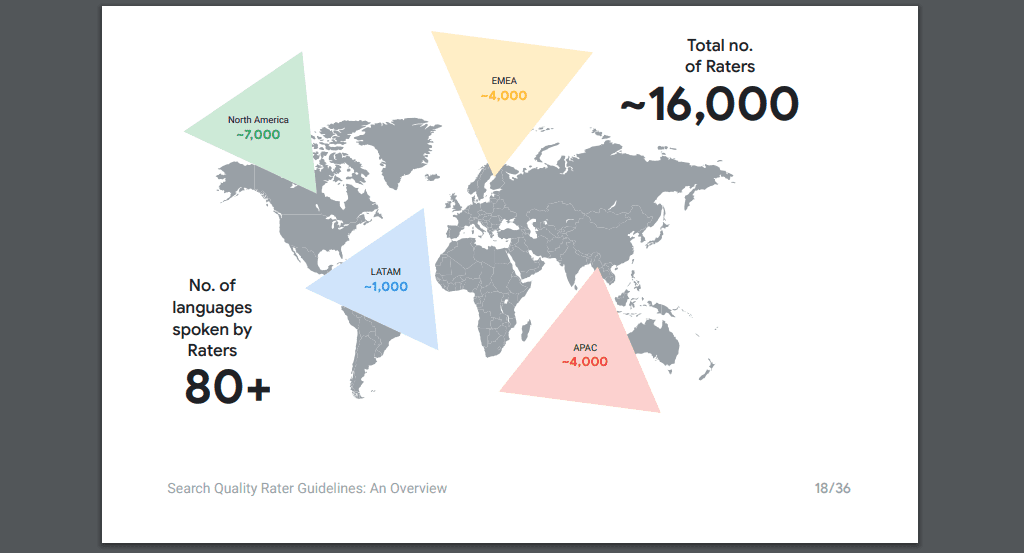
These evaluators now have three new metrics, which become particularly relevant in topics related to money and fundamental aspects of life.
They are the Your Money Your Life (YMYL) themes, which cover aspects like finance, investments, health, legality, current news, online shopping…
In fact, websites in these sectors were the most affected by the Medical Update.
But Google didn’t stop there and continued refining its quality criteria.
In 2022, a new update to its quality guidelines for evaluators was made, introducing an additional factor.
Thus, the E for Experience appears, transitioning from E-A-T to E-E-A-T.
The differences between EEAT and EAT
As we’ve seen, EEAT involves adding a new parameter, Experience, to the existing EAT criteria.
So, what does this change imply?
To help you better understand the importance of EEAT, we’re going to explain each of its initials.
But I don’t want to get too technical at this point. That’s why I want to use a real-world example to illustrate each concept.
The example I’ve chosen, and one that is likely familiar to you, is this: going to a job interview.
To make it more specific, the interview will be for a position as a software analyst at a multinational company, but I’m sure you’ll know how to adapt it to a case you’re more familiar with.
Let’s take a look at what EEAT exactly means.
Experience
Experience refers to the practical application of knowledge on a subject as well as personally lived situations.
If you’ve ever had a job interview, you’ll agree with me that experience is one of the most valued aspects.

A brilliant academic background is of little use if you’ve never worked in the business world.
Similarly, if the position is for a software analyst, it’s hard to get hired if you’ve only worked as a web developer. Even if you’ve been working for 20 years.
However, if you already have experience in the role, I’m sure the interviewer will pay more attention to you.
And if you can demonstrate it during your interview responses or through some test during the selection process, you’ll practically have the job in the bag.
Expertise
Expertise refers to the preparation, training, or mastery one has over a subject.
We could say that if experience refers to the more practical side, expertise has to do with the more theoretical perspective.
In our job interview example, expertise would be reflected in the section of our resume where we detail the more academic part: our studies, specialized courses, articles we’ve published in certain journals, conferences we’ve given, and so on.
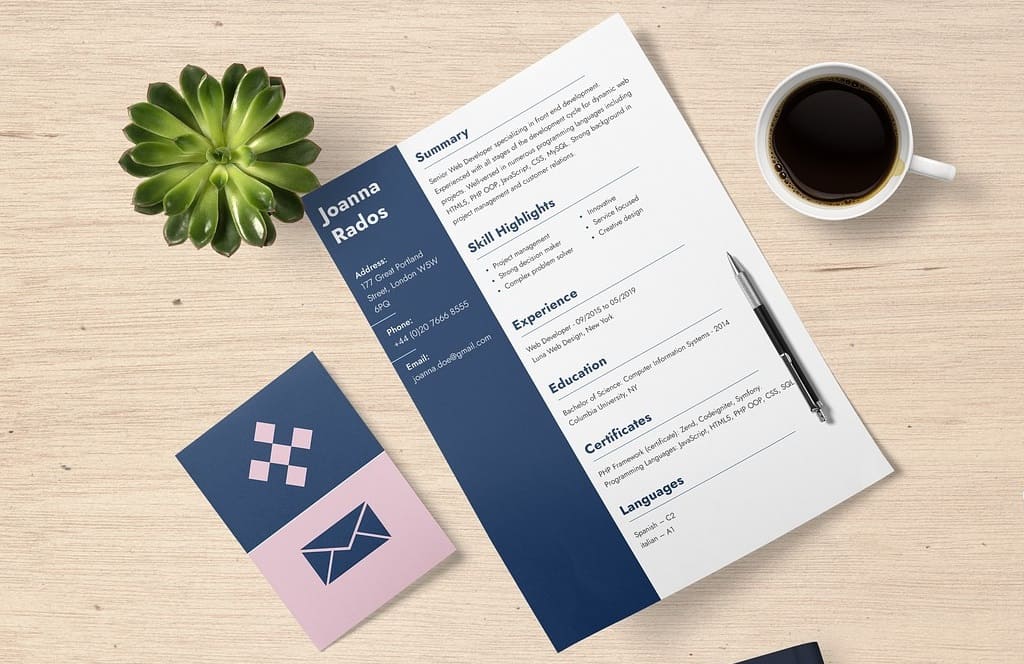
Thus, knowledge positions you as an expert in the field. Someone to be reckoned with.
But, as we’ve seen, even if you know a lot about a topic, the lack of demonstrable experience can make someone hesitant to hire you.
And that was precisely the reason why Google added the E for Experience to EEAT.
Authoritativeness
Authoritativeness is a measure of the reputation, visibility, or influence you have within a specific sector.
In the case of an interview, authoritativeness would be the answer to the question: how well-known is your name?
Appearing as a speaker at major conferences, being the author of several articles in your field, or simply having met with leaders of the new company in a meeting, are factors that boost your popularity.

But what if a project you participated in was featured in the news? Or if you were interviewed on the radio about a topic related to your field?
Then it’s possible that your name already resonates with the interviewer before your job interview, putting you in a very advantageous position for the new role.
Trust
Trust (Trust or Trustworthiness) refers to the credibility and reliability with which your brand is perceived.
Trust is the most important factor in EEAT. In fact, in a graphical representation that Google makes of these initials, trustworthiness is placed at the center.
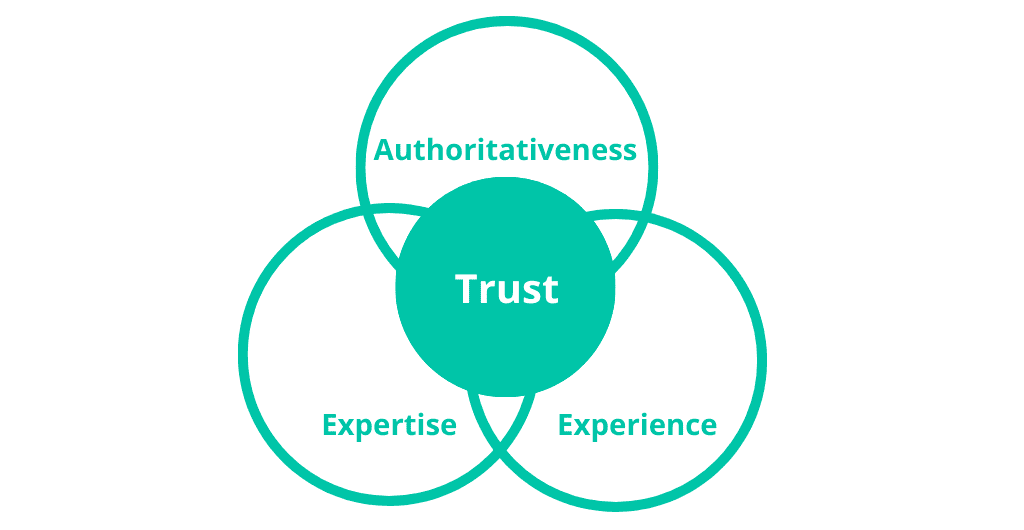
In a job interview, your resume is important, but perhaps even more crucial are the impressions you make on the person in front of you.
If your resume is well-organized and polished, if you maintain a friendly demeanor, if you display confidence in your answers, or if you’re honest and talk not only about your strengths but also your limitations, you’ll create a positive image of yourself.
A recommendation letter from your previous employer will also boost their trust in your abilities. And if someone inside the company knows you and speaks highly of you, you’ll be ahead of the game.
How to Improve Your Website’s EEAT to Rank on Google
Now that you understand what EEAT entails, it’s time to put it into practice.
And what better way than to see it on a real website?
In this section, I’ll tell you what you can do to enhance your website’s EEAT, using DinoRANK’s own page as an example.
We’ll look at strategies you can apply, and you’ll see what we’ve done so far to improve our brand’s credibility, as well as the steps we still need to take.
However, remember that not all topics have the same level of scrutiny from Google.
So, always maintain a critical mindset and don’t take these recommendations as gospel. Adapt them to your particular situation.
Create Content Based on Your Own Experience or That of Your Users
Demonstrating Experience in your website’s topic is essential if you want your users to trust you or your project.
However, as Google notes in its quality guidelines, experience doesn’t have to be limited to the author; it can come from third parties who contribute to improving the coverage of a specific topic.
Many elements contribute to showcasing Experience on a website. Here are some examples:
- Guest articles on a blog, where a topic is analyzed from the author’s perspective.
- User reviews of a product or service.
- Personal comments on posts.
- Real-life cases that show the results of a service or product use.
- Analyses and comparisons.
- Practical guides on how to do something.
At DinoRANK, we have been working on this factor for a long time, even before it was given a name.
Proof of this are the various practical guides on different SEO concepts.
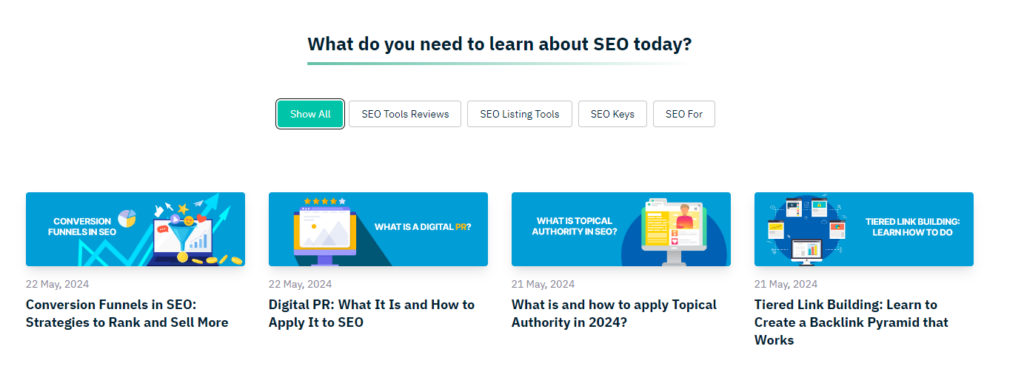
Special mention goes to the comparisons between SEO tools, where we speak honestly about their advantages and disadvantages compared to DinoRANK.
And, of course, the real reviews, both from users and SEO industry experts after using the tool.
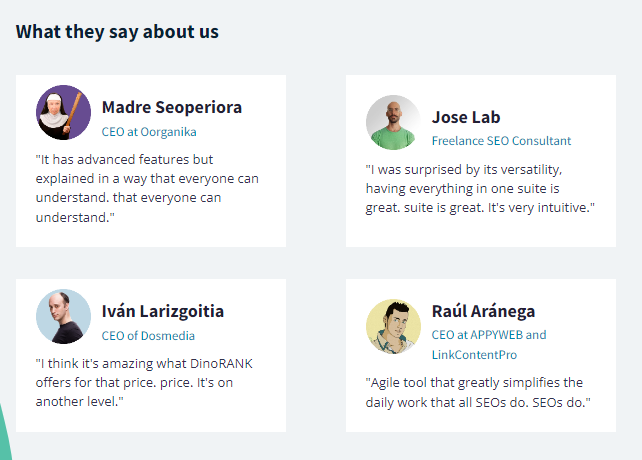
The Experience, in terms of both different aspects of SEO and the use of DinoRANK, is evident when you browse the website.
Showcase Your Expertise in Your Website’s Niche
When it comes to evaluating the Expertise of a website, the authors play a crucial role.
We need to clearly show Google who the project participants are and what their competencies and skills are.
Author pages, which are often forgotten and marked as “noIndex,” become particularly important here.
We should create an author page for each team member, well-crafted and indexable, as we want Google to take us into account.
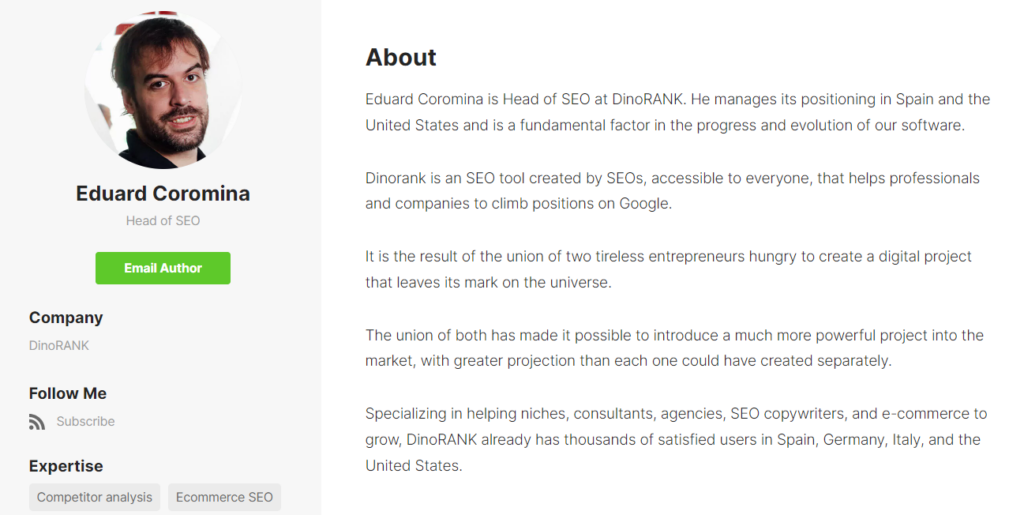
On this author page, we will include aspects such as:
- A brief biography
- Links to social networks, especially professional ones like LinkedIn.
- Information about current and past projects.
- Links to other mentions and external publications.
- Any other information that helps showcase the person’s professional experience.
On the DinoRANK blog, we have already started doing this with some authors.
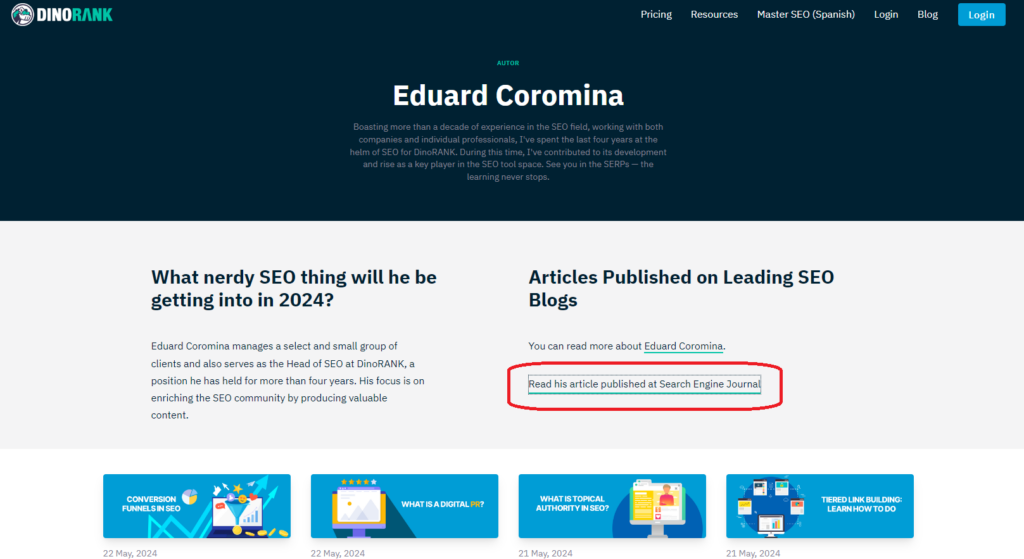
But it’s true that we still have more work to do.
In particular, this should be extended to all team members.
It would also be advisable for author pages to be tagged with the appropriate Schema markup. This way, it makes it easier for Google to evaluate anyone’s expertise.
To do this, there are various WordPress plugins or several web tools that allow you to easily generate the correct Schema markup for any page.
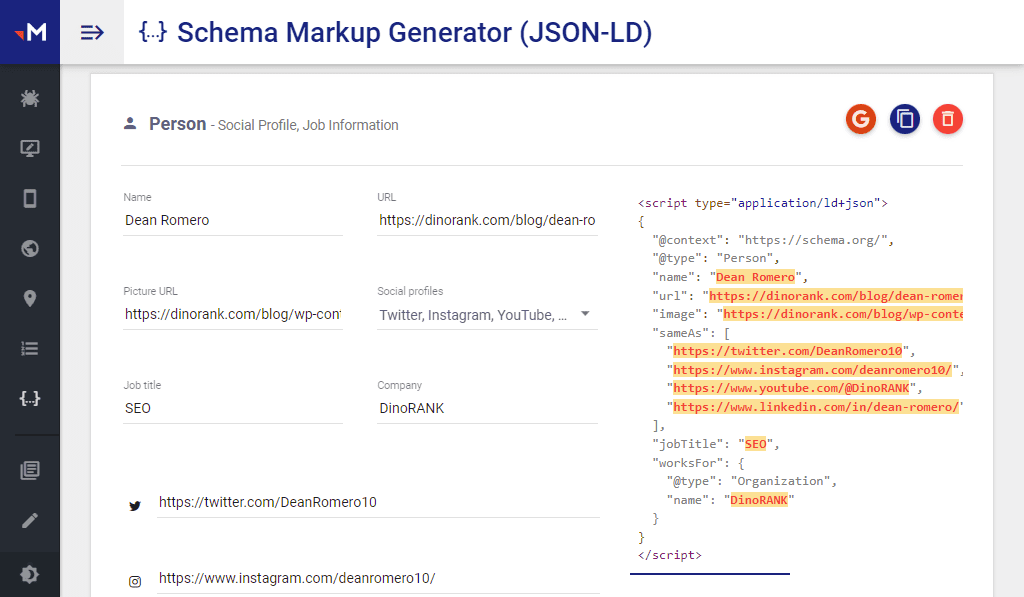
Now, we’ve talked about author pages, but if we want our expertise to be reflected across our entire website, we shouldn’t overlook the content.
Indeed, all our content should be a demonstration of our expertise and, therefore, should have the quality that is expected of it.
Any article should be well-written, free of spelling errors, and clearly indicate its author.
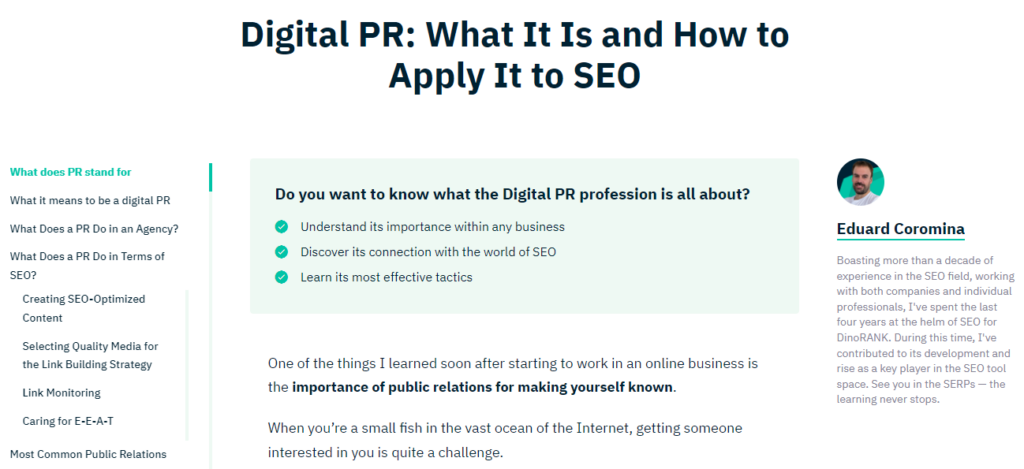
It should also indicate the date it was published and use links to relevant sources that back up what is being said.
At DinoRANK, we consider all these factors, but there is something we could do to improve the texts: cite sources using a standard format.
There are many web tools that allow you to do this easily, so it would be an improvement we could make to give a more professional look to our posts.
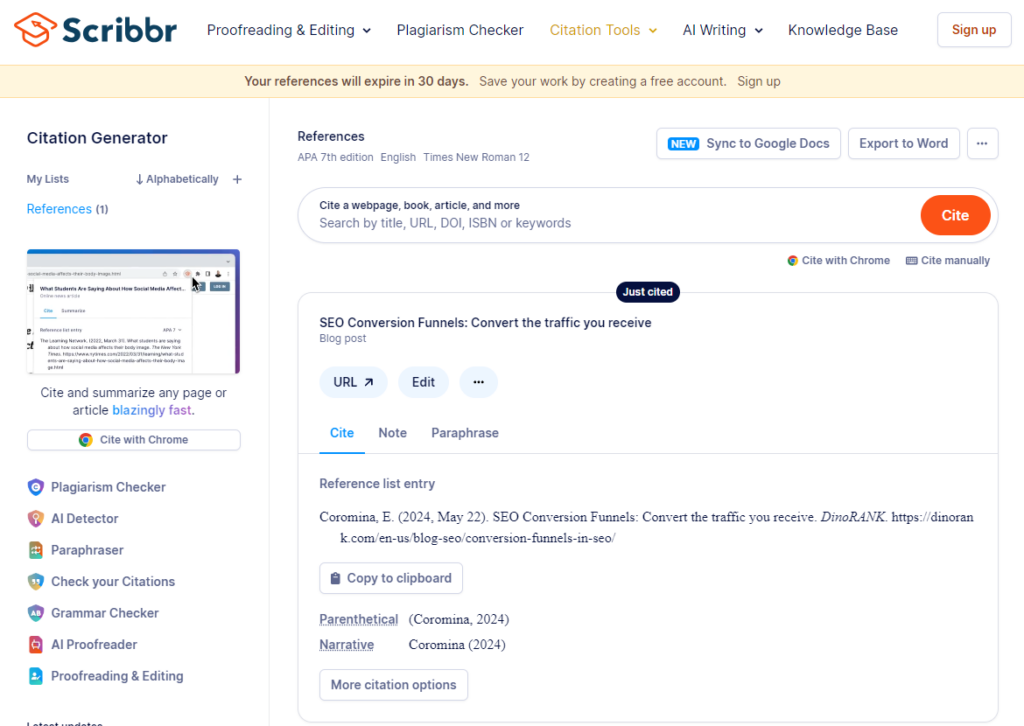
Work on Your Website’s Authority and Its Authors
The factor of Authority (Authoritativeness) is well-known to all SEOs.
Many have already worked on the popularity of their web pages through the creation of external links which, if of high quality, help improve their ranking in search engines.
At DinoRANK, we also focus on link-building. For this, we always look for well-known and thematically relevant sources that help us reach more users.
Here’s an example.
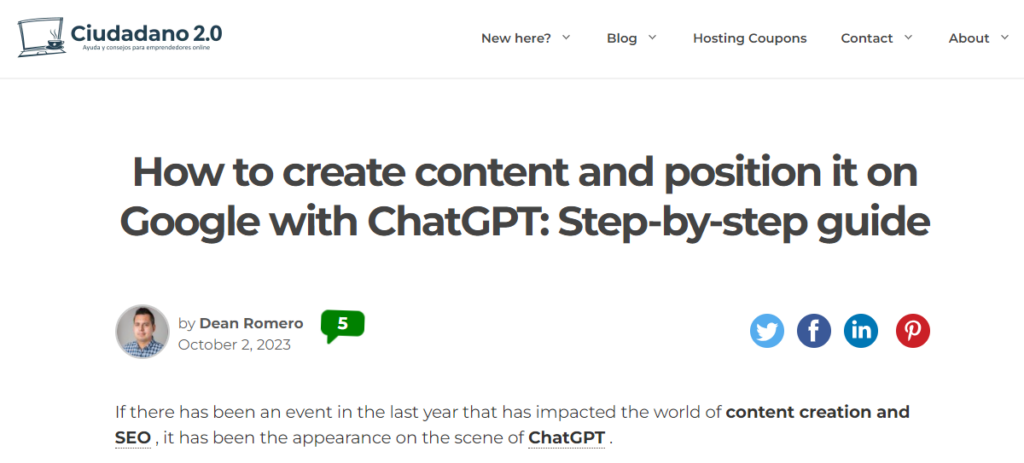
But authority doesn’t just apply to the website. It also affects the authors.
In this regard, we will increasingly see author pages linked from other websites.
And this is something we need to start doing at DinoRANK.
This way, we can leave a trail on the Internet about the importance of a person within a specific sector.
And Google’s algorithms or their quality raters can follow this trail to verify who is behind a website and if it’s someone reputable who is worth considering.
Build Trust with Your Users
As we have already seen, Trust is the aspect that Google places the most importance on.
In reality, if you work on the other three points of EEAT, you will be contributing to making your website more credible and trustworthy.
For example, genuine user reviews of DinoRANK help the tool to be perceived as reliable.
Videos showing real-time functionality help users understand the usefulness they can expect from its use.
Team member biographies help users feel a greater connection and security with what is being offered.
High-quality blog articles that address the user’s search intent, with verified information, real authors, and clearly visible publication dates are also a source of credibility.
But trust is also gained through more basic actions. For example:
- Properly configuring your website with the HTTPS protocol.
- Ensuring that the company’s legal information and terms of service are clearly visible.
- Providing an easily accessible contact form.
- Displaying clear product specifications indicating what each plan includes, who it is for, and final prices without hidden costs.
- Compiling the most frequently asked questions from users and giving clear and honest answers.
These are aspects we try to take care of at DinoRANK, as reflected in the following image.
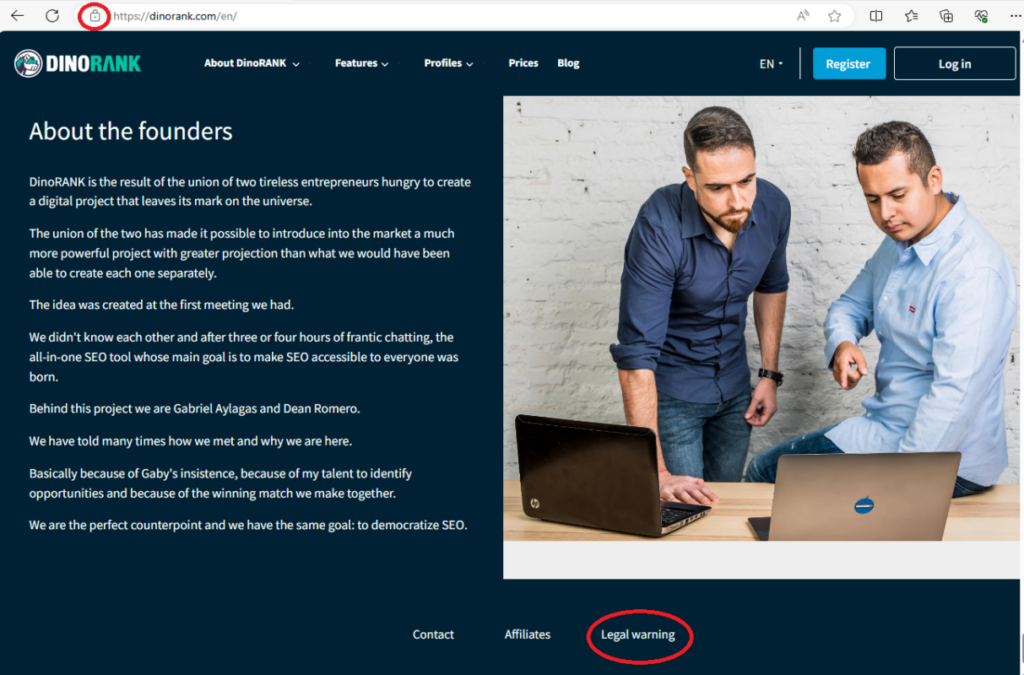
However, there is always room for improvement.
Specifically, the terms of service and payment methods could be made more visible (currently, they are within the legal notice). This hasn’t been done purely for aesthetic reasons, but it would be advisable to improve user trust.
Conclusions: Should You Work on EEAT for Your Website?
At this point, you might be wondering if it makes sense to consider EEAT for your website or if it’s only necessary if you cover topics related to health or money.
Hay que decir que EEAT, by itself, is not a ranking factor. It doesn’t directly influence the score that Google’s algorithm assigns to websites to determine their order in the SERPs.
However, in YMYL (Your Money Your Life) sectors, EEAT is an essential requirement for the search engine to consider the domain.
In other words, if your project is related to health, finance, or any other YMYL topic, you absolutely must work on EEAT. Otherwise, Google won’t even bother to assign it a ranking score, since it would not be worth displaying your website among its results due to a lack of necessary trustworthiness.
On the other hand, if your project has little or nothing to do with YMYL, EEAT is not an especially relevant aspect.
For now…
More and more topics are being reviewed by Google to ensure that the content shared is accurate and high-quality.
Especially with the rise of artificial intelligence, which is causing many websites to publish automatically generated content without prior verification.
That’s why it is very likely that, sooner or later, EEAT will become a basic requirement to rank any website in search engines.
So my recommendation is that if you have a serious web project that you want to grow over time, start working on EEAT today.
In this article, I’ve mentioned some strategies you can apply to your website.
Applying them won’t hurt you, and, on the contrary, they can make a difference when it comes to having a long-term project.

